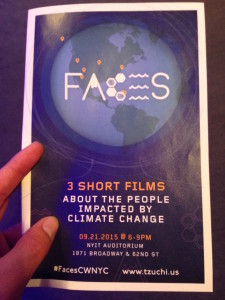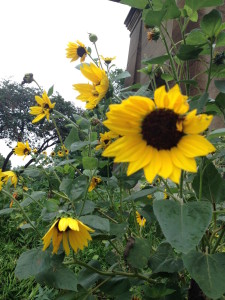Stung by the Climate – A report on A Film Event
Stung by the Climate
by Vincent Irizarry
I went to an event called Stung by the Climate, a unit of three short films at the New York Institute of Technology for Climate Week. Check out previews for the films here.
One of the films was on the health of our bee populations in the United States, Haïti, and France. The video interviewed organic honey farmers in Jacmel, Haïti, on their experiences with beekeeping. Due to climate change, weather patterns in the Caribbean islands are changing. Rainy seasons are becoming wetter and more intense while the hot summer months of July and early August bring extreme temperatures to the nation of Haïti. At the same time, deforestation in Haïti for charcoal is threatening the plant life throughout the nation. All of these extreme events have detrimental impacts on the bees and have harsh ramifications for traditional beekeepers who use the honey as a source of income.
Beekeepers must actively manage the bees, while in the past they used to provide an abundance of honey. Beekeepers have to initiate a Queen bee into the colony on a regular basis because, due to food scarcity, Queen bees either consume too much or too little as they support large numbers of offspring. The beekeepers realize bees do not adapt to new colonies as well as they used to, so they slowly introduce the new Queen so that she recognizes the scent of the new colony.
A group of Haïtian beekeepers were present atthe event and gave us the opportunity to ask questions. The bees’ immune systems are weakened by extreme dry heat and extreme moisture. In previous generations bees were less exposed to harsh weather patterns. The harsh weather also throws off when bees should start procreating, meaning feweroffspring are produced each year. The deforestation is dangerous because the natural antioxidants, pollen, and antibacterial cures the bees use are derived from the trees. Tree cutting leaves the bees with little food and bacteria tolerance. A problem for the beekeepers themselves is that it is becoming more difficult to ensure the health of the bees and each year the bees are producing less honey. Less honey means less can be sold for income and less can be used in local communities.
An article in TIME magazine by Bryan Walsh states “corn planting season can be extremely dangerous to honeybees due to the neonicotinoid pesticides that are used on these plants. ”
“When pollinators like honeybees forage in those fields, they can be exposed to dangerously high levels of the pesticides. Such widespread contamination makes it that much more difficult for beekeepers to find clean foraging territory for their charge—a task that’s already tough enough due to the growth of monocultures of crops like corn and soybeans that offer little nutrition for bees, and the gradual dwindling of noncropped rural lands.” (Walsh, TIME, 2015)
If we look at our agricultural system that we all actively have bought into, such as our genetically modified foods, these are directly hurting the honeybees.
The beekeepers gave us the opportunity to try the delicious honey, and it was beyond anything I’ve tasted in a store or even in farmers markets in NY.
Here are some potential solutions and actions you can take to help save the bees: :
- Do not buy cheaply produced/bargain honey. The bees are not as cared for and are often fed high fructose corn syrup as a food source. That translates to honey your body cannot metabolize. The natural honey holds antioxidants and supports local honey farmers and beekeepers.
- Plant flowers that are rich in pollen. In NYC, if you have a small windowsill, fire escape or yard, plant a pot with some sunflowers or a similar flower. These attract bees and contain food for their bodies.
- Try to reduce carbon emissions that relate to climate change. This goes for a lot of environmental problems. Steps to reduce your footprint include walking more, recycling everything possible, not purchasing plastic bottles…the list continues.
- Reduce the amount of genetically modified foods that we ate. I personally tried this and at first it can be difficult to track what we are eating because there are traces of these GMO plants in everything. The GMO plants use high amounts of pesticides which can cause large amounts of honeybee die-offs when they are navigating through these fields in search of food.
- The Time article states “Backyard beekeepers can’t save the honeybees but they can help.”
More and more businesses and individual homeowners are setting up a casual bee hive or two around their properties which can help maintain the health of bee populations in that local area. These small colonies won’t entirely save the entire population but can ensure food and shelter for bees when migrating.
- Lobby our local politicians in support of the honeybees and other pollinators.
- Set up a bee refreshment station in our gardens with sugar/water and set the bowl away from away possible contaminants.
- Tell a friend about the cause.
- Learn about the habits of these creatures.
For more information about bee preservation, check out this article by Jayne Leonard.


